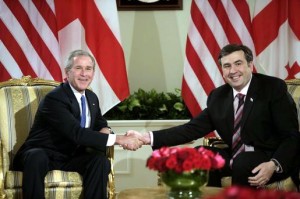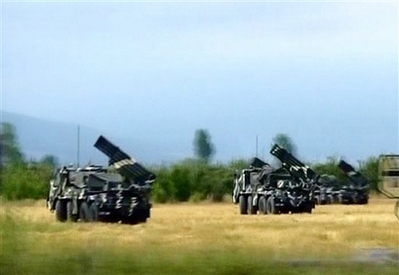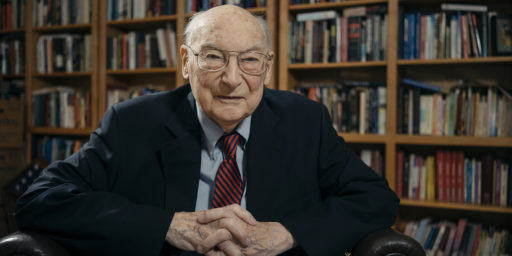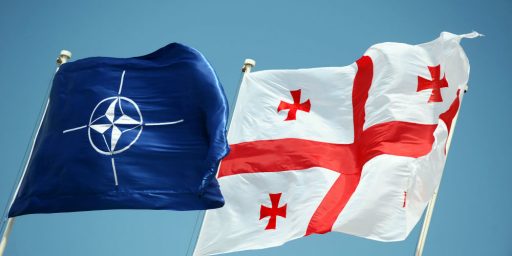Did U.S. Provoke Geogia-Russia Conflict?
 Josh Marshall argues that Georgia’s move to re-establish control over South Ossetia and Russia’s subsequent invasion are the fault of the United States, because “we pumped the Georgians up as our big Iraq allies, got them revved up about coming into NATO, playing all this pipeline politics, all of which led them to have a much more aggressive posture toward the Russians than we were willing, in the final analysis, to back up.”
Josh Marshall argues that Georgia’s move to re-establish control over South Ossetia and Russia’s subsequent invasion are the fault of the United States, because “we pumped the Georgians up as our big Iraq allies, got them revved up about coming into NATO, playing all this pipeline politics, all of which led them to have a much more aggressive posture toward the Russians than we were willing, in the final analysis, to back up.”
Kevin Drum, rightly, says this is nonsense, noting that Mikheil Saakashvili and Vladimir Putin had longstanding agendas that had little to do with George W. Bush.
Look: Saakashvili came to power on a Georgian nationalist platform of recovering Abkhazia and South Ossetia. He’s been jonesing for an excuse to send troops in for years, regardless of anything the U.S. did or didn’t do. Likewise, Putin has been eagerly waiting for an excuse to pound the crap out of him in return — again, regardless of anything the U.S. did or didn’t do. (You don’t think Russia was able to mount a highly precise counterattack within 24 hours just by coincidence, do you?)
Now sure, in general, Kosovo + missile shield + NATO enlargement + resurgent Russian nationalism formed the background for this war, and maybe the U.S. has played a bad hand on this score. But Bush administration officials have said for months (i.e., before the war started, meaning this isn’t just post hoc ass covering) that they’ve urged Saakashvili to stay cool. And I believe them. What else would they do, after all? There was never any chance that we were going to provide Georgia with military help in case of a Russian invasion, and it’s improbable in the extreme that anyone on our side said anything to suggest otherwise.
Quite so. Now, like Marshall (and Drum), I think the Bush administration made a huge strategic blunder in cheerleading for Georgian NATO membership without thinking through the implications. But, as Kevin observes, if Saakashvili interpreted that as a sign that Bush was prepared to go to war with Russia over South Ossetia, he was “delusional.” After all, making bold declarations without having any intention of backing them up with military force is a Bush family tradition.
More generally, while the United States remains the most important actor in world affairs, it’s ridiculous hubris to think that everything that happens in the world is a reaction to American policy. Other countries and other political leaders have interests that they’re prepared to act upon. In the vast majority of cases, what the U.S. thinks is a minor factor, indeed, in deciding how to pursue those interests.






James – I agree with you and Kevin re that we don’t control Georgia. But my worry is that we’re sending very mixed and confusing signals to both parties that are ripe for misunderstanding and further problems down the line. If you listen to what Saakashvili says, it’s obvious he’s trying to draw us and the west to his side of the argument and is seeking political cover for this military fiasco. On our part, our refusal to publicly understand Russian equities in this issue and assign a portion of the blame to Georgia for providing the Russians with causus belli will make Saakashvili more eager to seek payback with increased support from us, the EU and NATO. Stay tuned for developments.
Robert Kaplan reported about eight years ago that Georgians felt that until the pipeline was running, their security against the Bear was dire, but once the pipeline was running Europe would have to protect its interests. So, I think completion of the pipeline is an additional factor in bolstering Georgian (self/over) confidence.
My own view is that our foreign policy has suffered from an all but complete lack of a policy with respect to Russia for the last 17 years. This is a bipartisan failure but it’s not an unexpected one. U. S. foreign policy has been inclined to be an emergent phenomenon since we’ve been a country and that’s a slow process.
However, we shouldn’t forget that we’re not the only country that has interests or that acts (or fails to act) on those interests. Russia has its own interests and should be expected to act on them. So does Georgia and, since Mr. Saakashvili was elected on a nationalist platform we shouldn’t be too surprised if he’s a nationalist.
Germany, France, and the other EU countries have their own interests, too, and haven’t exactly been passive in their attitudes towards Georgia.
Bottom line: not everything is our fault.
PD Shaw speaks the truth, here.
Contrary to the BDS crowd’s complaint, what this all boils down to is money.
And, I should also say, it’s about control.
I reject the blame game Marshall is playing out of hand.
Are the states in question former Soviet states, and now free and independent nations? Or, are they, as Marshall seems to me to be arguing, still fiefdoms belonging to Russia?
If they are free and independent nations how is it “Mornic policy” (Mrshall’s words) to encourage them to act as free and independent nations? What Marshall seems to be proposing is not knuckling under to the former Soviet Union who for all the world is still acting like the Soviet Union putting down a rebel state within that union, as one would Lithuania, Poland, or Czechoslovakia, back in the day. And yes, I understand full well what I’m implying.
Bottom line:
The fault here is Russia’s, and Russia’s alone, who seemingly can’t get over the idea that they are no longer the power they once were, largely due to their own excesses. What Marshall propose does nothing but give deference to Russia because it might exhibit those excesses once again, as if they were the natural order of things, and acceptable.
It occurs to me to ask if Marshall would be so quick to blame America and its foreign-policy were there a Democrat in the White House doing exactly the same thing. I will remind you all that there was a Democrat in the White House pressing for former Soviet states to become NATO members not so very long ago, and that this process of getting Georgia into the world community directly, and not filtered through the dictates of Moscow has been going on for 15 years, now.
Funny how that never seems to make it into the discussion by way of the ‘blame America’ crowd.
Of course there’s a large reason for that omission, with a date of “November” stamped on it.
An interesting point, and an inadvertent warning to ourselves…
Here again, you try a ‘gotcha’ moment and it falls flat. Had you forgotten who won that one?
I am thinking about the future, not the past. Our dominant position in the world is not written in the stars…
Georgia started with killing 13 Russian peacekeepers that were stationed in South Ossetia according to the signed agreement. That was an act of war. How would you like US to act if another country committed an act of war against it?
Was it a crime for Israel to bomb Lebanon in 2006?
Now, Nikolay, don’t start letting facts get in the way of political posturing.
Dr. Joyner, I agree with the main thrust of your post, re the Marshall vs. Drum argument.
But re your critique of the Bush-43 Administration’s “cheerleading” (not an inapt phrase) for Georgia’s NATO admission, I respectfully disagree:
Yours, I gather, is the argument that we ought not surround Russia with NATO tripwires, because that will guarantee that we ultimately will be called upon to act to defend a NATO ally, and you obviously believe that if Georgia had gotten the NATO membership for which the Bush-43 Administration had been a cheerleader, Russia would have invaded it anyway and we wouldn’t have honored our NATO obligations to help defend it.
Obviously we’re both speculating, but I think your speculation is less persuasive than mine, which is that Russia would not have invaded the parts of Georgia other than the contested provinces if Georgia had indeed been a NATO member. (It well might have “re-enforced” its so-called “peacekeepers” in the disputed provinces, but if that were done in response to Georgia’s attempt to expel them, and they were already in situ upon Georgia’s admission, that would present a much finer point as to whether Russia’s limited re-enforcement triggered any NATO joint defense obligations, wouldn’t it?)
Russia has never before invaded a NATO member. The trip-wires have worked, so far. In the just and fair and civilized world that our doctrine and foreign policy ought to envision, the trip-wires wouldn’t encumber Russia from doing anything it ought not do anyway.
Your view seems to have as its premise that the Bear cannot be contained or managed, and that we therefore must leave some vulnerable smallish states adjacent to it, lest we make it too nervous and so that it will have convenient snacks when it grows hungry. That’s a cynical and hard-hearted view, if it’s indeed yours.
I believe the Bear should be contained. I believe we should continue to articulate and follow a clear policy in which invading one’s neighbors is not acceptable conduct. I believe we should be consistent, and that policy ought be applied to Georgia or Ukraine as willingly as to Poland or France or the U.K.
Given that the cheerleading failed, and that Georgia didn’t get the NATO admission we and it sought, then its leadership ought to have been more careful about giving Russia fig leaves to cover the broad military campaign that the Russians were obviously eager to conduct anyway.
But I utterly reject your conclusion that it was reckless, or thoughtless, for the Bush-43 Administration to support Georgia’s NATO membership, and I reject the notion that Saakashvili’s arguable rashness somehow proves that we displayed a lack of diligence in thinking through the consequences of our cheerleading. You’re guilty of the same sin you correctly attribute to Marshall, that of thinking that everything is all about us, or that when something has gone badly, it must be America’s fault somehow, if only to have failed to be so enlightened as to anticipate and somehow prevent it.
From what I understand, Georgia was being attacked by, uh, freedom fighters in South Ossetia but could not respond militarily because of Russian “peacekeepers” forming a trip line much the way we are in South Korea and Taiwan. Except Georgia finally got overconfident/fed up and tripped that line.
If that’s the way things really went down, it would be akin to allowing South Korea to fire mortar and missile attacks at North Korea, but expect that North Korea would do nothing to retaliate, and if they did and Americans were killed we would be justified in conquering North Korea. Surely most people taking Russia’s side now would call BS if the US tried to make the same argument.
What part of the world is that? Ours? Where torture sessions are directed from the White House…
So am I.
That’s certainly Russia’s side of things. But…Try digging a little deeper, Nikolay. Hint: JohnG’s on the right track.
While you have your thinking cap on, ponder all the great powers who have bled themselves on unnecessary military adventures, and ended up being not so great powers…
And whom is it gets to decide what is and is not ‘necessary’? You?
Please.
You position that American citizens should not have a voice in matters of war and peace is duly noted. Its pretty standard Bushie fare…
Yes don’t worry: it’s still all about US.
And so what international expertise do you bring to the table to enable you to make such judgement?
I could just as easily ask you the same question when you make one of your nearly constant calls for us to start wars.
Not everything James, only the bad things. At least, while there is a Republican president.